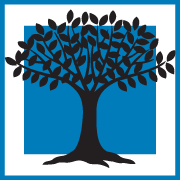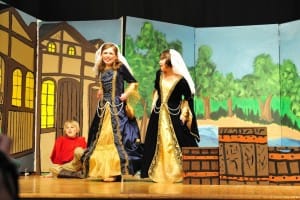Whether three- or thirteen-years-old, our students are citizens, questioners, leaders, and listeners.
The skills ignited by our experiential education program guide students through their journey
See The College School Journey reveal as you scroll down the page.

Home Away from Home
Creating beautiful, homelike, organized spaces full of a rich variety of wonderful materials is central to upholding the Reggio Emilia pedagogy in our Early Childhood spaces.
Preschool Fixure
Since 1992, the Reggio Approach has inspired our belief that all children have an important voice. Our Preschool students recently tested their creativity when they conceived of, developed, and ran a school-wide camera repair shop over the course of an emergent seventh-month-long project.
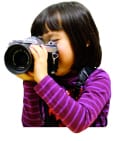
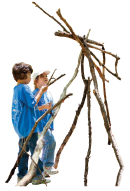
Day in the Woods
Kindergartners spend an entire day in the wilderness hiking, exploring, and conducting experiments. Their experience marks the beginning of our Adventure Education continuum, which culminates with the 8th Grade’s nine-day Field Ecology trip to the Southeast and six-day New Orleans trip.
Life Cycle
Studying the life cycle of chickens and nurturing the animals from egg to chicken coop is just one way 1st Graders experience hands-on science. Combining place-based education with this science theme teaches children stewardship and responsibility.

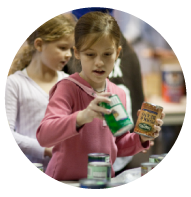
Wagon Train
Every fall since 1987, determined and cheerful 2nd and 3rd Graders have loaded red wagons with more than 3,000 collected canned goods.This child-powered train of wagons winds it way through the neighborhood to a local food pantry; the pantry’s empty shelves are soon filled. The Wagon Train is a four-week lesson in persuasive writing, community awareness, presentation skills, counting, graphing, and making caring common.
River City
As part of an 18-week Community Theme, 3rd Graders seek to understand how a community works. They visit neighborhoods, conduct interviews, invite experts to the class, conduct online reading, complete three-page research papers, and ultimately build a model community at the LaBarque Campus. Not only do they learn about urban planning, economic literacy, and community development, but also how to synthesize complex ideas into a concrete product.
World Peace
Created by master teacher John Hunter, The World Peace Game is a simulation of world governments and crisis solving. 4th Graders work collaboratively to solve crises around issues such as water rights, land disputes, natural disasters, climate change, and more. The multi-week game is a perfect fit for inquiry-based work and allows our students to explore the connectedness of the global community.


Monarch Theme
In the classroom, 5th Grade students raise larvae, interview experts from local universities, plant milkweed, and sew their own butterfly nets. In the field, they catch Monarchs and tag them as part of the international Monarch Watch Program. Students reflect on how human behavior can affect this insect’s habitat and 3,000-mile flight to Mexico.

Play
It takes courage to perform in front of 250 audience members. In the 4th/5th Grade’s fourteen-week play theme, courage helps bring social studies, art, and literature to life. The collaboration between two grades, seven teachers, and dozens of parents transforms our ten- and eleven-year-olds into veritable thespians.

Wilderness Experience
Since 1973, 6th Graders have ventured into the Shawnee National Forest for a week long back-packing trip. Canoeing, orienteering, a solo night, climbing, and rappelling are all part of this important rite of passage into Middle School. The passage marks a significant step on our students’ journey of discovering their independence and their unique identity.

Twentieth Century America
By Middle School, students think more critically and independently. An investigation into the broad forces, themes, and challenges of Twentieth Century America includes each student completing a nine-week, independent research project. Topics are selected, theses are crafted, sources are cited, and conclusions are defended in their five- to ten-page final papers.

Urban Studies
Street skills are put to the test in St. Louis’ Cherokee Street neighborhood and Chicago’s Pilsen Street neighborhood, as 7th Graders band together to explore and study these urban landscapes. Navigation, street interviews, investigative journalism, and collaborative skills are all part of this twelve-week Urban Experience class.
Field Ecology
By the time their nine-day Field Ecology trip to North Carolina arrives, the 8th Graders, armed with scientific equipment, know how to descend upon any creek to quickly and expertly report on the overall health of that ecosystem. They break into teams of botanists, chemists, human-impact researchers, zoologists, digital data collectors, and biologists to make their assessments. Collaborative, professional, experienced, and curious, they are true scientists.

Pathways to Leadership
Leadership is a skill that needs development and guidance. In Middle School, students are pushed to explore leadership pathways to understand their own leadership style. They can join Student Service Leadership Program or become a Junior Leader for a lower grade. Each empowers them to actively take on a leadership role.

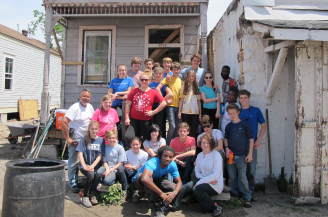
“Now What?” Capstone
In the spring of their final year, we ask students “Now What?” They’ve learned how to think, collaborate, and communicate; they’ve rock climbed and paddled; they’ve succeeded and accomplished. And now what? Service to The College School, local communities, and the hurricane-ravished community of New Orleans on a six-day trip provides the 8th Grade one final opportunity to give back.
Preschool Fixture
 Since 1992, the Reggio Approach has inspired our belief that all children have an important voice. Our Preschool students recently tested their creativity when they conceived of, developed, and ran a school-wide camera repair shop over the course of an emergent three-month-long project.
Since 1992, the Reggio Approach has inspired our belief that all children have an important voice. Our Preschool students recently tested their creativity when they conceived of, developed, and ran a school-wide camera repair shop over the course of an emergent three-month-long project.
Day in the Woods
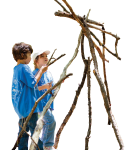 Kindergartners spend an entire day in the wilderness hiking, exploring, and conducting experiments. Their experience marks the beginning of our Adventure Education continuum, which culminates with the 8th Grade’s nine-day Field Ecology trip to the Southeast and six-day New Orleans trip.
Kindergartners spend an entire day in the wilderness hiking, exploring, and conducting experiments. Their experience marks the beginning of our Adventure Education continuum, which culminates with the 8th Grade’s nine-day Field Ecology trip to the Southeast and six-day New Orleans trip.
Life Cycle
 Studying the life cycle of chickens and nurturing the animals from egg to chicken coop is just one way 1st Graders experience hands-on science. Combining place-based education with this science theme teaches children stewardship and responsibility.
Studying the life cycle of chickens and nurturing the animals from egg to chicken coop is just one way 1st Graders experience hands-on science. Combining place-based education with this science theme teaches children stewardship and responsibility.
Wagon Train
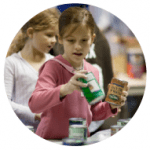 Every fall since 1987, determined and cheerful 2nd and 3rd Graders have loaded red wagons with more than 3,000 collected canned goods.This child-powered train of wagons winds it way through the neighborhood to a local food pantry; the pantry’s empty shelves are soon filled. The Wagon Train is a four-week lesson in persuasive writing, community awareness, presentation skills, counting, graphing, and making caring common.
Every fall since 1987, determined and cheerful 2nd and 3rd Graders have loaded red wagons with more than 3,000 collected canned goods.This child-powered train of wagons winds it way through the neighborhood to a local food pantry; the pantry’s empty shelves are soon filled. The Wagon Train is a four-week lesson in persuasive writing, community awareness, presentation skills, counting, graphing, and making caring common.
River City
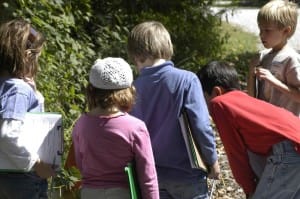
As part of an 18-week Community Theme, 3rd Graders seek to understand how a community works. They visit neighborhoods, conduct interviews, invite experts to the class, conduct online reading, complete three-page research papers, and ultimately build a model community at the LaBarque Campus. Not only do they learn about urban planning, economic literacy, and community development, but also how to synthesize complex ideas into a concrete product.
Space Study
 4th Graders know that communities exist both near and far. In their 12-week Space Theme, they explore the concept of the “Commons,” or shared spaces and resources. Not only do they investigate the science of space but also the ethical issues behind caring for the “Commons.” The study of space is a perfect fit for inquiry-based science and for inspiring a sense of awe and wonder about what exists high above us.
4th Graders know that communities exist both near and far. In their 12-week Space Theme, they explore the concept of the “Commons,” or shared spaces and resources. Not only do they investigate the science of space but also the ethical issues behind caring for the “Commons.” The study of space is a perfect fit for inquiry-based science and for inspiring a sense of awe and wonder about what exists high above us.
Monarch Theme
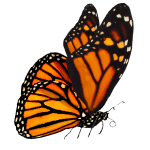 In the classroom, 5th Grade students raise larvae, build a light cage, interview experts from local universities, plant milkweed, and sew their own butterfly nets. In the field, they catch Monarchs and tag them as part of the international Monarch Watch Program. Students reflect on how human behavior can affect this insect’s habitat and 3,000-mile flight to Mexico.
In the classroom, 5th Grade students raise larvae, build a light cage, interview experts from local universities, plant milkweed, and sew their own butterfly nets. In the field, they catch Monarchs and tag them as part of the international Monarch Watch Program. Students reflect on how human behavior can affect this insect’s habitat and 3,000-mile flight to Mexico.
Play
It takes courage to perform in front of 250 audience members. In the 4th/5th Grade’s fourteen-week play theme, courage helps bring social studies, art, and literature to life. The collaboration between two grades, seven teachers, and dozens of parents transforms our ten- and eleven-year-olds into veritable thespians
Wilderness Experience
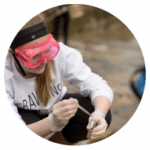 Since 1973, 6th Graders have ventured into the Shawnee National Forest for a week long back-packing trip. Canoeing, orienteering, a solo night, climbing, and rappelling are all part of this important rite of passage into Middle School. The passage marks a significant step on our students’ journey of discovering their independence and their unique identity.
Since 1973, 6th Graders have ventured into the Shawnee National Forest for a week long back-packing trip. Canoeing, orienteering, a solo night, climbing, and rappelling are all part of this important rite of passage into Middle School. The passage marks a significant step on our students’ journey of discovering their independence and their unique identity.
Twentieth Century America
 By Middle School, students think more critically and independently. An investigation into the broad forces, themes, and challenges of Twentieth Century America includes each student completing a nine-week, independent research project. Topics are selected, theses are crafted, sources are cited, and conclusions are defended in their five- to ten-page final papers.
By Middle School, students think more critically and independently. An investigation into the broad forces, themes, and challenges of Twentieth Century America includes each student completing a nine-week, independent research project. Topics are selected, theses are crafted, sources are cited, and conclusions are defended in their five- to ten-page final papers.
Urban Studies
Street skills are put to the test in St. Louis’ Cherokee Street neighborhood and Chicago’s Pilsen Street neighborhood, as 7th Graders band together to explore and study these urban landscapes. Navigation, street interviews, investigative journalism, and collaborative skills are all part of this twelve-week Urban Experience class.
Field Ecology
By the time their nine-day Field Ecology trip to Tennessee, Georgia, and North Carolina arrives, the 8th Graders, armed with scientific equipment, know how to descend upon any creek to quickly and expertly report on the overall health of that ecosystem. They break into teams of botanists, chemists, human-impact researchers, zoologists, digital data collectors, and biologists to make their assessments. Collaborative, professional, experienced, and curious, they are true scientists.
Pathway to Leadership
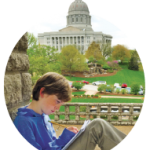 Leadership is a skill that needs development and guidance. In Middle School, students are pushed to explore one of several leadership pathways to understand their own leadership style. They can join Student Service Leadership Program, become a Junior Leader for a lower grade, or join the Diversity Council. Each empowers them to actively take on a leadership role.
Leadership is a skill that needs development and guidance. In Middle School, students are pushed to explore one of several leadership pathways to understand their own leadership style. They can join Student Service Leadership Program, become a Junior Leader for a lower grade, or join the Diversity Council. Each empowers them to actively take on a leadership role.
“Now What?” Capstone
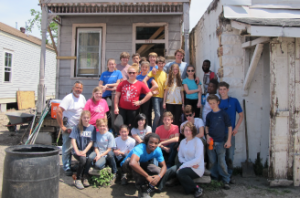
In the spring of their final year, we ask students “Now What?” They’ve learned how to think, collaborate, and communicate; they’ve rock climbed and paddled; they’ve succeeded and accomplished. And now what? Giving back to The College School, local communities, and the hurricane-ravished community of New Orleans on a six-day trip provides the 8th Grade one final opportunity to give back.

